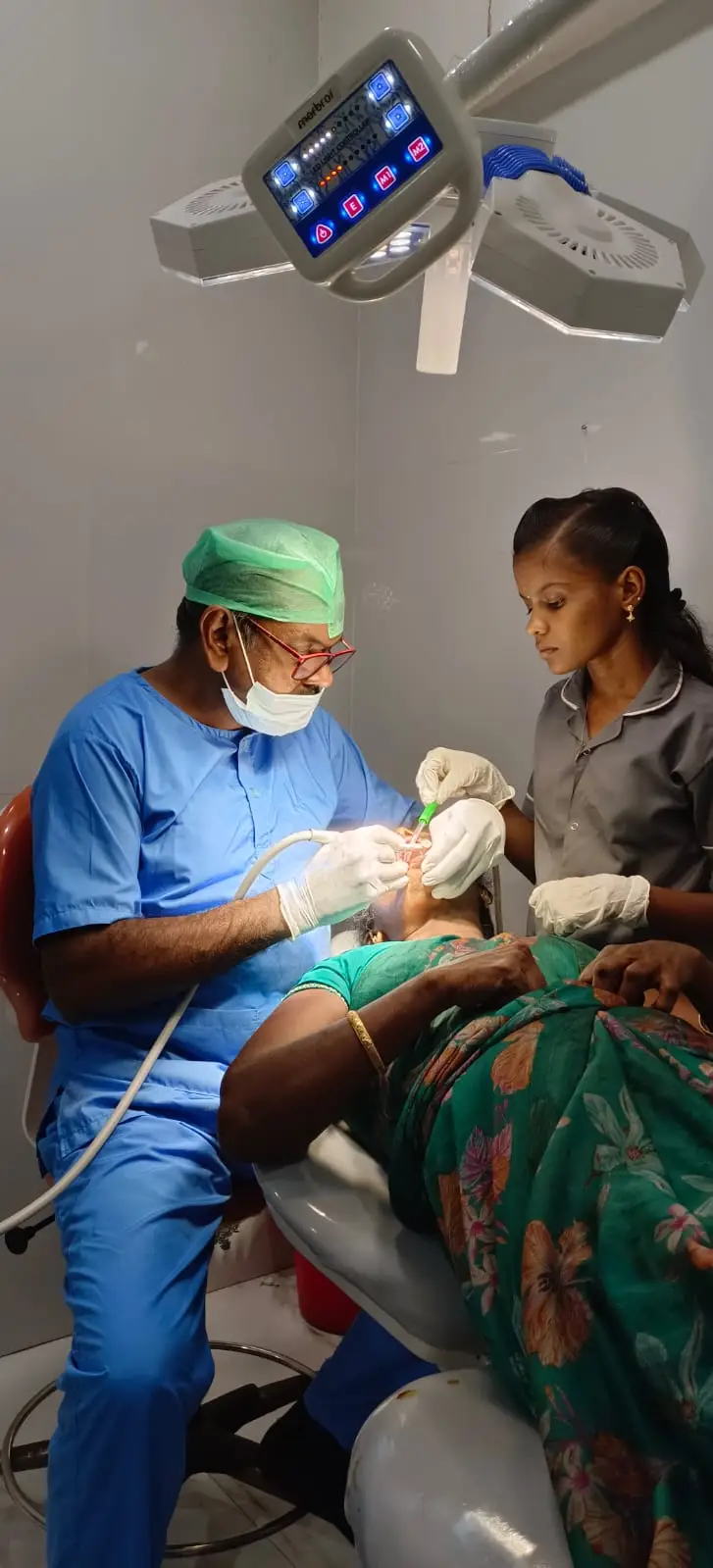Best Dental Clinic in Tirunelveli
Welcome to Sukumar Dental Clinic, the best dental clinic in Tirunelveli, proudly serving smiles since 1999. With expert care, advanced technology and a patient-first approach, we’re dedicated to creating healthy, beautiful smiles that last a lifetime.
ISO 9001 : 2015 CERTIFIED
Welcome to Sukumar Dental Clinic
As the Best Dental Clinic in Tirunelveli, We prioritizes your oral health and comfort. Our state-of-the-art dental clinic provides a full range of affordable dental care, including Preventive Dental Care, Cosmetic Dentistry, Orthodontics and Restorative Dentistry in Tirunelveli. Our experienced team of dentists are committed to delivering personalized care ensuring you leave with a healthy, confident smile.
Best Dentist in Tirunelveli
Dr. S. Sukumar MDS., is a highly respected dental surgeon with a strong specialization in Oral & Maxillofacial Surgery.
Highly Trained Dental Team
Our consultants and associate dentists are all highly trained in their specialties and stay current with the latest advancements in dental technology and science.

New Patient?
Contact Sukumar Dental Clinic to receive guidance on achieving your best oral health and to start your journey toward a healthier smile with our expert support!
- Emergency Dental Care?
+91 74 182 10 108
Your Nearby Oral Health Specialist
Trusted Family Dental Care Clinic in Tirunelveli
01.
Cosmetic Dentistry in Tirunelveli
Cosmetic Dentistry in Tirunelveli
Enhances smiles through advanced procedures like whitening, veneers and reshaping for aesthetic improvement.
02.
Root Canal Treatment in Tirunelveli
Root canal treatment removes infected tooth pulp, relieving pain and preserving the natural tooth with precision care.
03.
Periodontal Care
Periodontal dentistry focuses on preventing, diagnosing and treating gum diseases to ensure optimal oral health.
04.
Dental Implants
Involves surgically placing a metal post (usually titanium) into the jawbone, which acts as a sturdy anchor for a replacement tooth or bridge.
05.
Dental Trauma & Care
Any injury to your teeth, gums, jawbone or soft tissues of your mouth. Accidents, such as falls, car wrecks and sports-related injuries are the main cause of traumatic dental injuries.
06.
Pediatric Dentistry
Dedicated to the oral health of children from infancy through the teen years. We care for a child’s teeth, gums and mouth throughout the various stages of childhood.
07.
Orthodontic Braces
Dental braces corrects a wide range of dental issues, including crooked, gapped, rotated or crowded teeth. Types of braces, includes traditional metal braces, ceramic braces and clear aligners like Invisalign.
08.
Prosthetics
A custom-fabricated appliance created specifically to replace missing teeth. Prosthetics include Dental crowns, Dental bridges, Implants, Full dentures and Partial dentures.
- FOR STAR HEALTH INSURANCE
+91 74 182 10 108

Best Dental Clinic in Tirunelveli
Surgical Excellence for the Face and Jaw
At Sukumar Dental Clinic we are equipped to handle various conditions, including but not limited to:
- Facial Trauma: Injuries from accidents, sports or other incidents can cause fractures, lacerations and dislocations in the face and jaw. Our surgical team is adept at restoring both form and function, ensuring the best possible outcomes.
- Congenital and Developmental Deformities: Sukumar Dental Clinic offer corrective surgery for congenital issues such as cleft lip and palate, as well as developmental conditions like jaw misalignment, which can affect both appearance and functionality.
- Temporomandibular Joint Disorders (TMJ Treatment): TMJ disorders can cause significant pain and dysfunction in the jaw. Our specialists provide both surgical and non-surgical treatments to alleviate symptoms and improve quality of life.
- Oral Pathologies: From benign cysts to malignant tumors, our team at Sukumar Dental Clinic is experienced in diagnosing and treating a variety of oral pathologies. We work closely with oncologists and other specialists to ensure comprehensive care.
- Dental Implants in Tirunelveli: Whether you are missing a single tooth or require full mouth reconstruction, we provide durable, aesthetically pleasing dental implants.
Dr. S. Sukumar MDS.,
Oral & Maxillofacial Surgeon
Complete Dental Care on Your Schedule
Bringing Life to Your Smile @ Best Dental Clinic in Tirunelveli
Expert Dentists
Personalized care, advanced treatments and exceptional results for every patient.
Advance Treatment
Utilizing cutting-edge technology for precise, efficient and lasting oral care.
Guaranteed Results
Treatment ensuring reliable results, patient satisfaction and long-term oral health.
Modern Equipment
Delivering enhanced precision, comfort and efficiency for superior patient care.
Happy Stories
Best Dental Clinic in Tirunelveli





How to Find Sukumar Dental Clinic
Fill up the Form and Ask Your Queries
Address
Sukumar Dental Clinic
4P, SDN Corner Building, Samathanapuram,
Palayamkottai, Tirunelveli,
Tamil Nadu 627002
Phone
+91 462 2 586 472
+91 74 182 10 108
info@sukumardental.com
Book Your Appointment
Frequently Asked Questions
What dental services do you offer at Sukumar Dental Clinic in Tirunelveli?
At Sukumar Dental Clinic, we offer a wide range of services to cater to your dental needs. These include general dental care, preventive treatments, cosmetic dentistry (such as teeth whitening and smile makeovers), restorative procedures (like dental implants and root canal treatment), orthodontics (including braces and clear aligners), and specialized treatments like wisdom teeth removal and periodontal care.
How often should I visit the dentist for a checkup in Tirunelveli?
We recommend visiting your dentist every 6 months for a routine dental checkup. This ensures that any dental issues, such as cavities or gum disease, are caught early. Our clinic provides thorough dental exams and teeth cleaning and polishing to maintain your oral health and hygiene.
Do you offer cosmetic dental services like teeth whitening in Tirunelveli?
Yes, we specialize in cosmetic dentistry and offer several services to improve your smile, including laser teeth whitening and veneers. Whether you need a smile makeover or want to brighten your teeth with professional whitening, our experienced team is here to help.
What is the cost of dental implants at Sukumar Dental Clinic?
The cost of dental implants varies based on the complexity of the treatment. At Sukumar Dental Clinic, we provide affordable dental implants in Tirunelveli. We recommend scheduling a consultation with our experts to get an accurate estimate tailored to your specific needs.
What should I do if I have a dental emergency in Tirunelveli?
In case of a dental emergency, you can contact us for immediate assistance. Our clinic offers Emergency Dental Care in Tirunelveli for issues like tooth pain, broken teeth or accidents. We are equipped to handle urgent situations and provide relief when you need it most.
What types of braces do you offer for adults and children in Tirunelveli?
We offer a variety of orthodontic treatments, including traditional braces and clear aligners for both adults and children. Our team of experienced orthodontists can help you decide the best option based on your needs. Whether you're looking for braces for adults or kids braces, we provide effective and affordable treatments.
Are your dental services safe for children?
Yes! At Sukumar Dental Clinic, we have a pediatric dental clinic dedicated to ensuring your child's dental health is in safe hands. Our pediatric dentist in Tirunelveli specializes in providing gentle care for young patients. We offer services like kids dental checkups, preventive care, and dental treatments for children in a friendly, child-oriented environment.
What should I expect during a root canal treatment?
During a root canal treatment, we remove the infected tissue from the inside of the tooth, clean and seal it, and restore the tooth with a crown if necessary. Our expert dentists ensure that the procedure is as comfortable as possible. If you're experiencing severe tooth pain, it might be time for a root canal treatment to save the tooth.
How can I maintain oral hygiene between my visits to the dentist?
Maintaining proper oral hygiene is essential for keeping your teeth healthy. We recommend brushing twice a day, flossing daily, and using mouthwash. Additionally, regular teeth cleaning and polishing at Sukumar Dental Clinic will help remove plaque and prevent future dental issues. If you have any concerns about your oral health, feel free to ask us for personalized advice during your routine dental checkup.
Do you provide dental x-rays and what is their purpose?
Yes, at Sukumar Dental Clinic, we provide dental x-ray services to help us diagnose dental issues that are not visible during a regular checkup. This is crucial for detecting cavities, gum disease, and issues with dental implants or root canal treatment. Our digital x-rays are safe, fast, and effective for accurate diagnosis.
What is a smile makeover and how can it help me?
A smile makeover involves a combination of cosmetic treatments designed to improve the appearance of your smile. It can include teeth whitening, veneers, dental implants, or crowns and bridges. If you're looking to enhance your smile, our team can create a personalized plan to help you achieve your desired results.
Can I get dental implants if I have missing teeth?
Yes, dental implants are an excellent solution for replacing missing teeth. At Sukumar Dental Clinic, we specialize in providing high-quality dental implants in Tirunelveli that look and function like natural teeth. If you're considering implants, we can evaluate your oral health and determine if you're a good candidate for the procedure.
Are there any options for clear aligners instead of traditional braces?
Yes! We offer clear aligners as a discreet and comfortable alternative to traditional braces. If you're looking for a more aesthetic way to straighten your teeth, clear aligners might be the right choice for you. Our orthodontists can discuss your options and help you find the best solution for your smile.
How can I book an appointment for dental treatments at Sukumar Dental Clinic?
Booking an appointment is easy! You can call our clinic directly or use our online booking system to schedule your visit. Whether you're looking for a routine checkup, cosmetic treatment, or emergency dental care, we're here to assist you.
What are the benefits of veneers for my teeth?
Veneers are thin, custom-made shells that cover the front surface of your teeth to improve their appearance. They can help correct issues like stains, chips, gaps, or misalignment. If you're looking for a smile makeover in Tirunelveli, veneers are a quick and effective way to achieve a more radiant and uniform smile.
What should I do if I have tooth sensitivity?
Tooth sensitivity is often caused by worn enamel or gum recession. If you experience sensitivity when eating hot, cold, or sweet foods, we recommend visiting our clinic for a thorough examination. We can provide treatments such as flouride applications or suggest more sensitive toothpaste. If necessary, we also offer root canal treatments for more severe cases of sensitivity.
How can I prevent gum disease?
Preventing gum disease starts with maintaining good oral hygiene habits, such as brushing and flossing regularly. We also recommend regular dental cleanings at Sukumar Dental Clinic to remove plaque and tartar buildup, which can lead to gum issues. Our clinic specializes in periodontal treatments if you have early signs of gum disease.
Can clear aligners work for adults as well?
Yes, clear aligners are an excellent option for adults looking to straighten their teeth discreetly. Unlike traditional braces, clear aligners are virtually invisible and can be removed for eating and cleaning. Our orthodontic treatments are customized to fit your specific needs, whether you're an adult or a child seeking a more aesthetic solution.
Do you offer emergency dental services for tooth pain or injuries?
Yes, we understand that dental emergencies can happen unexpectedly. Sukumar Dental Clinic offers emergency dental treatment for various issues like severe tooth pain, broken teeth, or dental injuries. We are here to help you in urgent situations and provide immediate relief to manage pain and prevent further damage.
Are there flexible payment options available for dental implants and other services?
Yes, we offer flexible payment options for treatments like dental implants and other major procedures. Our goal is to make quality dental care accessible, and we are happy to discuss options that fit your budget. Please contact our team to learn more about available payment plans.